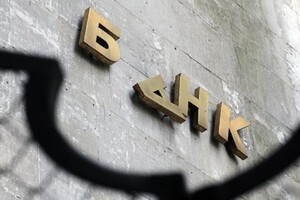According to the nationalization scheme of “Privatbank” – recognition of worsening solvency and redemption for 1 hryvnia.

The Verkhovna Rada registered draft law No. 8069 “On Amendments to the Tax Code of Ukraine and some other laws of Ukraine regarding the peculiarities of withdrawing a systemically important bank from the market under martial law”.
The author of the legislative initiative is Danylo Hetmantsev, head of the parliamentary committee on finance, tax and customs policy. Among the authors of this document are Yaroslav Zheleznyak, Viktoriya Kinzburska, Iryna Allahverdiyeva, Yulia Didenko, Yevhen Petrunyak. the state will suspect deterioration of solvency. That is, according to the same scheme by which “Privatbank” was nationalized at one time.
Read also: 20 banks in Ukraine are at risk of bankruptcy – AUB
As stated in the explanatory note to the project , nationalization is a much less expensive procedure for the state, both literally and psychologically – for the banking market.
“The classification of a systemically important bank as insolvent due to the loss of liquidity and its subsequent removal from the market under the general procedure under martial law is too onerous and creates additional risks for the system as a whole. In particular, the liquidation of such a bank may result in the emergence of distrust in the banking sector, provoke a further chain reaction of outflows of funds, the loss of funds by clients of such a bank, a decrease in the potential of lending to the population and businesses, partial destruction of the payment infrastructure. Moreover, the payment by the Individual Deposit Guarantee Fund of 100 percent of the amount of deposits to individuals will lead to significant losses of the State Budget,” he writes Hetmantsev in the explanatory note.
At the same time, nationalization of the bank, the head of the parliamentary committee is convinced, will not only not be financially burdensome, but will also make it possible to restore the work of the financial institution and minimize the risks of deployment negative phenomena on the market.
The draft law proposes to give the state, represented by the Ministry of Finance of Ukraine, the right, upon the proposal of the National Bank of Ukraine, to participate in the withdrawal from the market of a systemically important bank, in respect of which the central bank made a decision to classify it as insolvent.
In fact, the nationalization of a systemically important bank will take place through the procedure of assigning the bank to the category of insolvent, but without recapitalization by the state. The sale of the bank will be carried out for UAH 1, regardless of the actual size of the bank's regulatory capital on the day of the relevant decision by the National Bank of Ukraine.
The draft law also proposes to introduce the termination of the bank's obligations before the controllers and owners of a significant stake in such a bank.
“Reimbursing the value of shares to shareholders will be possible only after compensation for losses to the state of Ukraine from the Russian Federation,” Hetmantsev explains its legislative initiative.
Read also: Which 20 banks are at risk of bankruptcy due to an increase in the NBU discount rate – expert's version
Recall that in March the NBU updated the list of systemically important banks. It has 14 banking institutions: Alfa-Bank, A-Bank, Kredobank, OTP Bank, Oschadbank, Pivdennyi, Privatbank, PUIB, Raiffeisen Bank, Taskombank, Ukrgasbank, Ukreximbank, Ukrsibbank, Universal Bank.
A month ago, the NBU announced the number of unprofitable banks based on the results of the second quarter.
Related video
Despite certain positive trends in the banking sector of Ukraine, according to the results of the II quarter of 2022, more than two dozen banks turned out to be unprofitable, and some of those that maintained profitability did this is due to the reduction of own expenses, in particular wages. Thisis discussed in the Overview of the banking sector for the second quarter of the current year, issued by the National Bank.




